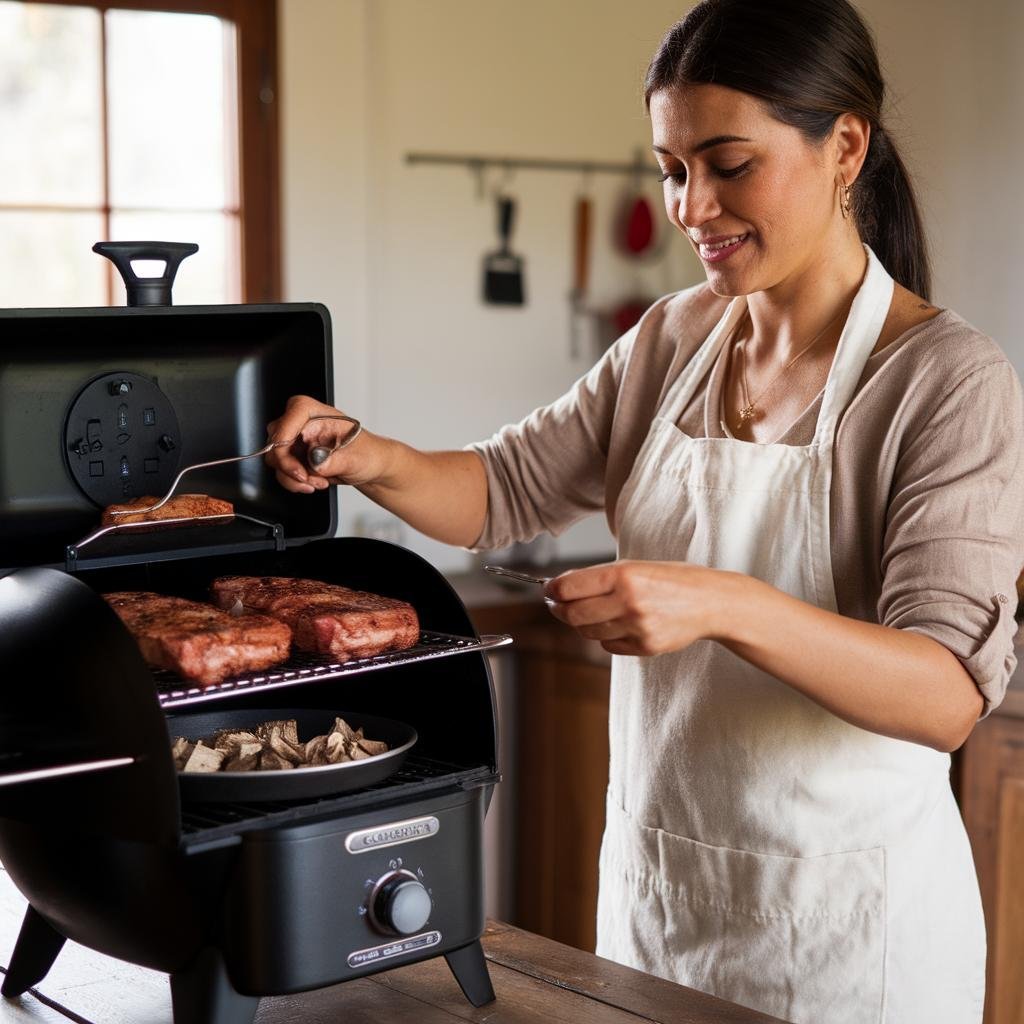Disclosure: This Post Contains Affiliate Links; We earn a commission on purchases.
Welcome to our guide on making homemade pizza dough! Whether you’re a pizza enthusiast or just looking to try your hand at homemade pizza, we’ve got you covered. With our easy recipe, you’ll be able to create a perfect pizza crust every time. Say goodbye to store-bought dough and hello to delicious homemade pizza!
Key Takeaways:
- Creating homemade pizza dough is simple and requires just 6 basic ingredients.
- This recipe yields a soft and chewy crust that can be customized with your favorite toppings.
- Use all-purpose flour for a softer crust or bread flour for a crispier crust.
- Flavor the dough by adding garlic powder or dried basil leaves for an extra kick.
- Stretching the dough can be done using a rolling pin or your hands, allowing you to achieve the desired thickness and shape.
The Best Flour for Homemade Pizza Dough
When it comes to making homemade pizza dough, choosing the right type of flour can make a significant difference in the texture and taste of your crust. The two most commonly debated options are bread flour and all-purpose flour. Let’s take a closer look at the characteristics of each to help you decide which is best for your pizza-making endeavors.
Bread Flour
Bread flour is a high-protein flour that contains more gluten compared to all-purpose flour. This higher protein content gives bread flour its distinctive chewiness and ability to create a crispier crust. If you prefer a pizza with a slightly denser texture and a nice crunch, bread flour is an excellent choice.
All-Purpose Flour
All-purpose flour, as the name suggests, is a versatile flour that can be used in a variety of baking recipes. It has a moderate protein content, making it suitable for both cakes and breads. In the case of homemade pizza dough, all-purpose flour is an accessible and easy-to-use option. It produces a softer and more tender crust, perfect for those who enjoy a lighter and more delicate bite.
If you don’t have bread flour on hand, don’t worry! This pizza dough recipe has been developed and tested using all-purpose flour so you can confidently achieve a delicious result. However, if you prefer a crust with more structure and a satisfying crispness, using bread flour is a fantastic alternative.
Ultimately, the choice between bread flour and all-purpose flour comes down to personal preference. Whether you’re a fan of a chewy, crispy crust or a softer, more delicate one, both flours can yield exceptional results when used correctly. So go ahead and experiment with different flours to discover your own perfect homemade pizza dough!
Tips for Flavoring and Stretching Pizza Dough
While pizza dough is primarily a base for your favorite toppings, you can add some extra flavor by incorporating garlic powder or dried basil leaves into the dough. Simply sprinkle a dash of garlic powder (about ¼ teaspoon) or dried basil leaves before adding the oil and water.
As for stretching the dough, you have a couple of options. You can use a rolling pin or your hands. If you prefer a thinner crust, roll the dough out into a circle. Alternatively, you can use your hands to flatten and stretch the dough until it reaches the desired width. Don’t forget to pinch the edges to make a crispy crust or fold them over for a thicker, doughier crust.
Flavoring Pizza Dough with Garlic and Basil
| Ingredients | Quantity |
|---|---|
| Pizza dough | 1 batch |
| Garlic powder | ¼ teaspoon |
| Dried basil leaves | ¼ teaspoon |
Stretching Pizza Dough Techniques
- Rolling pin: Place the dough on a lightly floured surface. Roll out the dough in all directions, turning it regularly, until it reaches the desired thickness.
- Hand stretching: Flatten the dough with your hands, then start stretching it gently from the center outward. Rotate the dough as you go, ensuring even stretching.
Experiment with different flavor variations by adding other herbs, such as oregano or thyme, or even some red pepper flakes to spice things up. The choice is yours to create a customized and delicious pizza dough that suits your taste buds.
Making Homemade Pizza with the Dough
Now that you’ve prepared the homemade pizza dough using our easy recipe, it’s time to unleash your creativity and turn it into a delicious homemade pizza masterpiece. Whether you’re a fan of classic Margherita, love the tangy flavors of BBQ chicken, or prefer to experiment with your own unique combinations, the options for toppings are endless.
Here are a few ideas to inspire you:
- Pepperoni, mushrooms, and bell peppers
- Spinach, feta cheese, and black olives
- Prosciutto, arugula, and shaved Parmesan
- Grilled chicken, bacon, and ranch dressing
Feel free to mix and match your favorite ingredients to create a pizza that suits your taste buds. Remember, homemade pizza is all about personalization and having fun in the kitchen.
Once you’ve selected your desired toppings, it’s time to assemble your pizza. Roll out the prepared dough into your desired thickness and shape. If you prefer a thinner crust, roll it out to about 1/4 inch thickness. For a thicker crust, aim for around 1/2 inch. Use your hands or a rolling pin to achieve the desired shape and size.
Now, generously sprinkle some flour or cornmeal onto a baking sheet or pizza stone to prevent the dough from sticking. Carefully transfer the stretched dough onto the prepared surface. Make sure to create a slight raised edge by pinching the dough along the outer perimeter to form a crust. This will help contain the toppings and add an extra crunch to your finished pizza.
Next, it’s time to add the flavorful sauce. Whether you prefer a classic marinara sauce or want to experiment with pesto, garlic butter, or even BBQ sauce, spread a thin and even layer across the surface of the dough, leaving about a 1/2-inch border for the crust.
Now comes the fun part—the toppings! Arrange your desired ingredients evenly over the sauce-covered dough. Whether you prefer gooey mozzarella, a variety of fresh vegetables, or even some cured meats, the choice is yours.
Once you’ve added your toppings, it’s time to bake your homemade pizza to golden perfection. Preheat your oven to 425°F (220°C) and place the pizza on the center rack. Bake for approximately 15 minutes, or until the crust is golden brown and the cheese is bubbly and slightly browned.
Remember, baking times may vary depending on the thickness of your crust and the amount of toppings you’ve added. Keep a close eye on your pizza during the last few minutes to ensure it doesn’t burn.
When the aroma of freshly baked pizza fills your kitchen and the cheese is perfectly melted, remove the pizza from the oven and let it cool for a few minutes. This will allow the crust to firm up slightly, making it easier to slice and enjoy.
Now, it’s time to indulge in your homemade masterpiece. Serve your pizza slices with a sprinkle of fresh herbs, such as basil or oregano, and a drizzle of extra-virgin olive oil if desired.
So go ahead, gather your favorite toppings, roll up your sleeves, and enjoy the satisfaction of creating your own homemade pizza with the perfect crust.
This mouthwatering image showcases a variety of delicious homemade pizza toppings such as pepperoni, mushrooms, bell peppers, spinach, feta cheese, black olives, prosciutto, arugula, shaved Parmesan, grilled chicken, bacon, and ranch dressing—all ready to be added to your own homemade pizza creation.
Tips for Preparing and Storing Pizza Dough
If you want to enjoy homemade pizza anytime, it’s a great idea to prepare and store pizza dough in advance. With a few simple steps, you can have fresh dough readily available whenever a craving strikes.
Preparing Pizza Dough in Advance
When making pizza dough in advance, it’s important to allow it enough time to rise before storing it. Follow these steps:
- Step 1: Prepare the pizza dough according to the recipe, allowing it to rise for 30 minutes or until it has doubled in size.
- Step 2: Once the dough has risen, gently deflate it and knead it briefly until smooth.
- Step 3: Shape the dough into a round ball. If you prefer, you can divide it into individual portions for smaller pizzas.
By following these steps, you can prepare pizza dough in advance and keep it in the refrigerator or freezer until you’re ready to use it.
Storing Pizza Dough
Properly storing pizza dough is key to maintaining its freshness and quality. Here’s how to store pizza dough in the refrigerator and freezer:
Remember to wrap the dough tightly in all storing methods to prevent moisture loss and to keep it from absorbing any odors from other foods in the fridge or freezer.
| Storage Method | Duration | Instructions |
|---|---|---|
| Refrigerator | Several days | Place the dough in a lightly oiled bowl and cover it with plastic wrap. Store it in the refrigerator for up to 3 days. |
| Freezer | Up to a month | Wrap the dough tightly in plastic wrap and place it in a freezer-safe bag or container. Label it with the date and store it in the freezer for up to a month. |
When you’re ready to use the stored dough, simply remove it from the refrigerator or freezer and let it thaw if frozen. Gently deflate and knead the dough until smooth before shaping it into the desired pizza crust.
By following these tips for preparing and storing pizza dough, you can have homemade pizza ready to go whenever the craving strikes. Say goodbye to last-minute grocery store runs and enjoy the convenience of having fresh dough on hand!
Conclusion
Making your own homemade pizza dough is a rewarding and enjoyable experience that doesn’t have to be intimidating or time-consuming. With this easy recipe, you can achieve a perfect pizza crust every time, whether you’re a beginner or an experienced baker. By following the step-by-step instructions, you’ll be able to create delicious homemade pizzas with a soft and chewy crust that will impress your family and friends.
The key to homemade pizza success lies in choosing the right flour and adding your favorite flavors to the dough. Whether you prefer all-purpose flour for a softer crust or bread flour for a crispier texture, this recipe can accommodate your preferences. Additionally, incorporating garlic powder or dried basil leaves into the dough adds an extra layer of flavor to your pizza, making it truly irresistible.
Not only does making your own pizza dough allow you to control the quality of ingredients and customize your toppings, but it also eliminates the need for store-bought dough. Say goodbye to bland or inconsistent crusts and hello to the satisfaction of creating your own perfect pizza crust at home. So grab your apron, roll up your sleeves, and let’s embark on a pizza-making adventure that will delight your taste buds and leave you craving for more!
References

Ryan Conlon is a BBQ enthusiast and inspired chef on a journey through the smoky, savory world of outdoor cooking. Hailing from the heart of the Midwest, Ryan’s passion for grilling ignited during his early years, where family gatherings often revolved around the sizzle of the grill and the aroma of seasoned meats.







